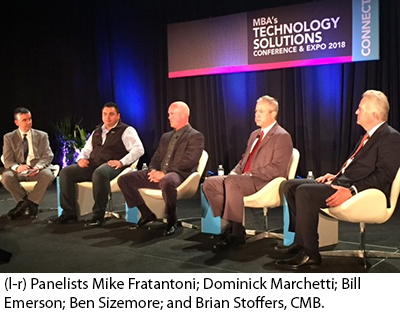
Technology Innovation: Executive Perspectives
DETROIT–Different models; different strategies; different successes. Regardless of the approach, executives here at the Mortgage Bankers Association’s Technology Solutions Conference & Expo agree: technology is transforming their business.
“A lot of people need to decide: am I prepared to invest in the technology that is needed to move forward?” said Bill Emerson, Vice Chairman with Rock Holdings Inc. and 2016 MBA Chairman. “In five years we are going to see an incredible amount of consolidation of data, and it all has to be about creating a better customer experience. As technology evolves, there will be companies that do it well.”
 Emerson said the future mortgage consumer is going to use this data “any way they can.”
Emerson said the future mortgage consumer is going to use this data “any way they can.”
Ben Sizemore, senior vice president of mortgage transformation with Pentagon Federal Credit Union, Arlington, Va., agreed. “We are trying to create a better member experience,” he said. “We have a self-serve model that is transformed not only by technology, but also in the way we work. We look forward to the opportunities in leveraging data to give our members the experience they want.”
Sizemore said other aspects of the loan process, such as auto loans, remain far ahead of the mortgage process. “We have to get better; online is the play. We have members overseas that want to–and have to–obtain a complete mortgage online. We have to be able to accommodate them.”
MBA Vice Chair Brian Stoffers, CMB, and global president of debt and structured finance with CBRE, Los Angeles, noted the commercial/multifamily industry has been “slow to the table” in using technology. “That’s changing,” he said. “We’re now starting to aggregate information to change the way we work with clients.”
But panelists acknowledged holes persist. “If you have a digital process that comes to a screeching halt when you have to sign your name 750 times on documents, then you are creating a disconnect,” Emerson said.
Dominick Marchetti, chief technology officer with loanDepot LLC, Foothill Ranch, Calif., said his company is looking at blockchain as a means of aggregating and protecting data. “It is an evolutionary process,” he said. “We are taking extra steps to protect our data, and blockchain is going to be a part of that process.”
Emerson agreed. “Blockchain is going to have a place in the mortgage process and in real estate,” he said. “But it’s still very new and in its infancy in the mortgage process. I’m concerned that right now it’s just a buzzword and a lot of people don’t really know what it means.”
Stoffers sounded less optimistic noting CBRE is going in a different direction. “I think blockchain has a black eye right now because of its association with Bitcoin,” he said. “We are upgrading our back office functions and working with third parties in upgrading our data.”
With the cost to produce a loan averaging $8,500, “what many people think this means is, ‘we need less humans,'” Emerson said. “We think of that in the reverse. Obviously, some costs can be eliminated through technology, but the real costs savings are going to come from within.”
Stoffers noted CBRE spent more than $400 million on technology last year. “It’s a broad platform, but we now have more than 80 business teams trying to improve client outcomes. If we can do that, then we’re going to come out ahead.”
Emerson said mortgage servicing is “ripe” for overhaul. “If you think about mortgage servicing as an effective way to interact with the customer, then you can create a positive experience,” he said. “There’s all kinds of automation that can and should take place…the consumer experience is extremely important and servicing is a place where that experience should be positive.”
Marchetti noted looking forward, the technological advantage goes not to large or small banks, but “those who are willing to invest and technology and transform their business.”
Emerson agreed. “It’s about who really wants the capital and who has the capital to invest,” he said. “Don’t overestimate the large banks, because they can pull together the capital. The problem will be with those companies that have legacy systems that will slow them down.”
Sizemore said it’s not just about investment in technology, but people. “For us, it’s about being willing to put the money in to help our people do their jobs better,” he said. “If you’re a non-bank, you can be a little more agile, but it’s about leadership.
Speaking of disruption, an even bigger technology challenge looms on the horizon, with Amazon’s recent announcement that it will get into the mortgage business.
“I would ever underestimate Amazon,” Emerson said. “Whatever they do, they do well.”
